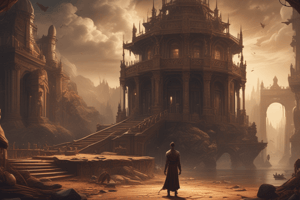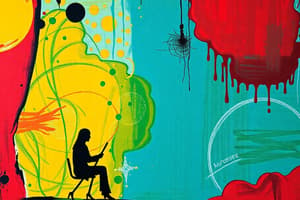Podcast
Questions and Answers
Which style of drama challenges conventional notions of reality and meaning?
Which style of drama challenges conventional notions of reality and meaning?
- Farce
- Realism
- Absurdism (correct)
- Comedy
In dramatic literature, which term encompasses both comedies and tragedies?
In dramatic literature, which term encompasses both comedies and tragedies?
- Tragedy
- Farce
- Comedy
- Drama (correct)
Which play by Anton Chekhov explores the conflict between tradition and modernity?
Which play by Anton Chekhov explores the conflict between tradition and modernity?
- Death of a Salesman
- The Cherry Orchard (correct)
- Oedipus Rex
- The Misanthrope
What is a characteristic of farce in dramatic works?
What is a characteristic of farce in dramatic works?
Which influential drama by William Shakespeare delves into themes of revenge, ambition, and madness?
Which influential drama by William Shakespeare delves into themes of revenge, ambition, and madness?
'The Misanthrope' by Molière satirizes the hypocrisies of which society?
'The Misanthrope' by Molière satirizes the hypocrisies of which society?
What is the central element that typically drives the plot forward in a well-crafted drama?
What is the central element that typically drives the plot forward in a well-crafted drama?
Which ancient civilization's tragedies and comedies were among the earliest and most influential forms of dramatic literature?
Which ancient civilization's tragedies and comedies were among the earliest and most influential forms of dramatic literature?
What does dialogue in a drama primarily help to reveal?
What does dialogue in a drama primarily help to reveal?
Which element of drama contextualizes the story and highlights its themes by providing the time and place in which the drama unfolds?
Which element of drama contextualizes the story and highlights its themes by providing the time and place in which the drama unfolds?
What is the main purpose of the characters in a drama?
What is the main purpose of the characters in a drama?
Which period in European history gave rise to the development of dramatic literature as it is known today?
Which period in European history gave rise to the development of dramatic literature as it is known today?
Flashcards
Dramatic Literature
Dramatic Literature
Storytelling that happens on stage through characters, dialogue, and action.
Drama
Drama
A written work intended for performance.
Conflict (in drama)
Conflict (in drama)
The central element that drives the plot forward through struggles.
Dialogue (in drama)
Dialogue (in drama)
Signup and view all the flashcards
Tragedy
Tragedy
Signup and view all the flashcards
Comedy
Comedy
Signup and view all the flashcards
Farce
Farce
Signup and view all the flashcards
Realism (in drama)
Realism (in drama)
Signup and view all the flashcards
Absurdism (in drama)
Absurdism (in drama)
Signup and view all the flashcards
Experimental Theater
Experimental Theater
Signup and view all the flashcards
Oedipus Rex
Oedipus Rex
Signup and view all the flashcards
Hamlet
Hamlet
Signup and view all the flashcards
Study Notes
Exploring Dramatic Literature
Dramatic literature, often referred to as plays or dramas, is a form of storytelling that unfolds on a stage through the interplay of characters, dialogue, and action. This genre has been captivating audiences for thousands of years, and its evolution has shaped the very fabric of literature itself.
Definition and History
A drama, at its most basic, is a written work intended for performance. Dramas emerged around the world at different times, with ancient Greece's tragedies and comedies being among the earliest and most influential forms. In Europe, medieval mystery plays and morality plays were popular before the Renaissance gave rise to the development of dramatic literature as we know it today.
Elements of Drama
A well-crafted drama typically includes:
- Conflict: This central element drives the plot forward as characters struggle with each other or their own personal challenges.
- Characters: Distinct and memorable characters, with unique traits and motivations, are at the heart of a drama.
- Dialogue: Conversations between characters reveal their thoughts, feelings, and relationships, while also advancing the plot.
- Setting: The time and place in which the drama unfolds helps to contextualize the story and highlight its themes.
Types of Drama
Throughout history, various forms of dramatic literature have emerged, each with its unique characteristics and purposes.
-
Tragedy: A dramatic work that ends in sorrow or disaster, often exploring themes of hubris, fate, and catharsis. Tragedies frequently focus on the downfall of a powerful or flawed character.
-
Comedy: A dramatic work with a happy ending that features humorous situations, character types, or plots. Comedies often aim to entertain audiences while also making social commentary or exploring human nature.
-
Farce: A fast-paced, broadly comedic play that relies on physical humor, absurd situations, and quick-witted dialogue for laughs.
-
Drama: A general term that encompasses both comedies and tragedies, dramas are often more serious and focus on realistic or realistic-sounding situations, emotions, and characters.
Dramatic Literature in Modern Times
Dramatic literature has not only endured but also thrived throughout the centuries. Modern dramas explore a wide range of themes, from existential dilemmas to social issues, while also employing a variety of forms and styles.
-
Realism: A style of drama that aims to portray life as it is, focusing on ordinary characters and everyday situations. Realism often emphasizes the importance of setting and naturalistic dialogue.
-
Absurdism: A style of drama that challenges conventional notions of reality and meaning, often featuring absurd or surreal situations and dialogue. Absurd plays typically aim to provoke thought and discussion about the human condition.
-
Experimental Theater: A style of drama that pushes the boundaries of conventional theater, often incorporating nontraditional forms of expression, such as mixed media, improvisation, or nonlinear narratives.
Influential Dramatic Works
Throughout history, a variety of dramatic works have left an indelible mark on literature, theater, and culture. Some of the most influential dramas include:
- Oedipus Rex by Sophocles, a tragic drama that explores the themes of fate, hubris, and retribution.
- The Misanthrope by Molière, a comedy that satirizes the hypocrisies of French society while also exploring the nature of love and relationships.
- Hamlet by William Shakespeare, a tragedy that delves into the nature of revenge, ambition, and madness.
- The Cherry Orchard by Anton Chekhov, a drama that explores the conflict between tradition and modernity, as well as the themes of loss and the passing of time.
- Death of a Salesman by Arthur Miller, a drama that examines the American Dream and the human cost of failure and success.
The Legacy of Drama
Dramatic literature, with its unique ability to capture the human condition through the interplay of characters, dialogue, and action, has been a powerful influence on literature, theater, and culture. Dramas, whether comedies, tragedies, or experimental works, have the ability to entertain, provoke thought, and inspire change. As such, dramatic literature remains an essential and enduring form of storytelling that continues to engage and captivate audiences across the globe.
Studying That Suits You
Use AI to generate personalized quizzes and flashcards to suit your learning preferences.





